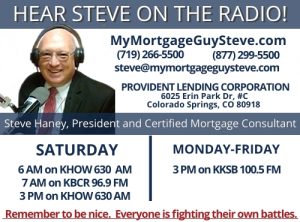You have heard about reverse mortgages, but aren’t quite sure if they’re legitimate or a scam? Are you wondering if one is right for you or an older homeowner you know? This blog will talk to you about some of the reverse mortgage myths.
Reverse mortgages have become increasingly popular in recent years. As a result, many misperceptions have sprung up. Reverse mortgages can be a useful financial tool for older homeowners, but they’re not for everyone. It pays to know the myths and facts. If you live in Colorado and are interested in what a Colorado Reverse Mortgage could do for you or a loved one, call Steve at: (877) 299-5500. He’s got your back, and has a reverse mortgage on his own home!
Myth #1: The bank is going to boot me out of my home
This is just not true. The reverse mortgage program is designed to keep seniors in their homes. As long as they follow some basic rules. They are allowed to live in the home with no house repayments until the last borrower permanently leaves the home. The basic rules are that homeowners need to stay current with the property taxes, home- owners insurance, live in the home as their primary residence, and keep the home in good repair. This applies even if the balance on the reverse mortgage loan is higher than the current market value of the home.
Myth #2: The bank takes all of my equity
This is also not true. On traditional loans, you are required to make payments to pay down the loan balance. On a reverse mortgage, there are no payments, however, banks are not charities. They don’t loan money for free. They charge interest and other fees on the money that you borrow. However, on a reverse mortgage, instead of making you pay the money back, the bank simply adds the interest and fees onto the loan balance every month. That means that your loan balance will go up every month instead of down, because you are not making any payments.
Myth #3: I am giving my home to the bank
This is also just not true. With a reverse mortgage, you always maintain ownership of your home, not the bank. Because you always own the home, you can pay off the reverse mortgage loan at any time. Any equity left over is yours to keep. There are no prepayment penalties. Yes, there will be a mortgage recorded against your home just like any other traditional loan. You will also be getting monthly statements from the bank, so there will never be any surprises as to how much you owe.
Myth #4: Reverse mortgages should only be used as a last resort
It’s never a good idea to make a financial decision under stress. However, most of the time is just mathematics. The sooner you do the loan, the more you save. Waiting until a small issue becomes a big problem reduces your options. If you wait until you are in a financial crisis, a little extra income each month probably won’t help.
Myth #5: Reverse mortgages are for the poor
Many older couples take out reverse mortgages so they will have a fund for emergencies and extra cash to enjoy life. In today’s world, both baby boomers and the wealthy are turning to these loans to manage their existing mortgage or to help pay off debt.
Myth #6: A fixed rate reverse mortgage is always better than an ARM
If you’re like most homeowners, you’ve had a traditional 30-year home loan with a fixed interest rate. This allowed you to know how much you needed to budget for mortgage payments each month. However, this conventional thinking does not apply to reverse mortgages, which do not require any monthly payment. Reverse mortgages with fixed interest rates:
- These loans require borrowers to draw all of their funds out at closing, which means they will pay interest on a potentially large sum of money. This could use up your home equity very quickly.
- The fixed rate option normally does not pay out nearly as much money to the homeowner.
An adjustable rate HECM, on the other hand, gives borrowers the option to select a line of credit and only incur interest on what they use. The unused portion of the line of credit will increase over time, giving borrowers access to even more cash. Most reverse mortgages today are done under the ARM so the homeowner can get access to as much money as possible.
Myth #7: Reverse mortgage counseling is a waste of time
Deciding whether to take out a reverse mortgage loan can be challenging. It’s hard to estimate how you’ll stay in your home and what you’ll need to live there over the long term. Seniors are also often victims of fraud. Federal law requires that all individuals who obtain a HECM reverse mortgage receive unbiased counseling by an independent 3rd party.
A trained counselor can help you understand the costs and features of different types of reverse mortgage, and evaluate the pros and cons of these loans for your situation. They will also discuss other options including public and private benefits that can help you stay independent longer.
Contact Steve Haney at: (719) 266-5500 for the current list of approved counselors. Telephone-based counseling is available worldwide, and face-to-face counseling is available in many communities.
Remember: Steve has a revers mortgage on his own home! Call him today at: (719) 266-5500 to talk to him about your own reverse mortgage










